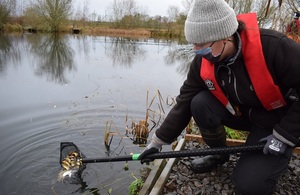Press release
The Environment Agency has released thousands of fish bred at its national fish farm into North East rivers and stillwaters

The Environment Agency’s Natalie Wallace releases fish into Dissington Pond
The Environment Agency’s festive fish release has seen more than 26,000 fish released into rivers and stillwaters in Northumberland, County Durham and Teesside.
All the fish were reared at the Environment Agency’s national fish farm near Calverton, Nottinghamshire, using funding from rod licence sales.
The work is part of the Environment Agency’s ongoing plan to develop, restore and create fisheries in the region to encourage people to get outdoors and enjoy angling safely.
Some of the fish released into Dissington Pond.
‘Very important aspect of our work’
Paul Frear, Fisheries Officer for the Environment Agency in the North East, said: “
Restoration and the creation of new fisheries is a very important aspect of our work. This past week has seen more than 26,000 fish released. We hope it encourages more people to get out and enjoy fishing on the North East’s beautiful waters!
We work closely with our partners to protect and enhance our fisheries. Our teams are on the ground responding to pollution incidents, working to improve habitats and water quality, and removing barriers to fish migration.
The Environment Agency’s Paul Frear releases fish into Willowgarth Pond.
The Environment Agency released:
- 1,500 chub and 2,000 barbel into the River Tees at Low Coniscliffe near Darlington.
- 1,500 chub, 2,000 barbel and 2,000 dace into the River Wear at The Sands, near Durham city centre.
- 2,000 chub, 1,000 barbel and 2,000 dace into the River Skerne split between Newton Aycliffe and Beaumont Hill, near Darlington.
- 2,000 dace into Clow Beck, south of Darlington.
- 1,000 bream and 500 rudd at Lockwood Beck, which is just south of Guisborough
- 9,000 fish – roach, bream, tench, rudd and crucian carp – released into stillwaters at Dissington Pond near Ponteland, Northumberland, Westgate Pond near Yarm, and Willowgarth pond near Croft-on-Tees.
The Environment Agency releases fish into waterways annually. Fisheries officers carry out fish stocking using data from national fish surveys to identify where there are problems with poor breeding and survival, as well as supporting angling clubs to boost local fishing spots.
The Environment Agency has set a target to get 1 million people fishing by 2025.
Anyone fishing must abide by current government coronavirus restrictions in their local area to keep themselves and those around them safe.
All rod licence income is used to fund work to protect and improve fish stocks and fisheries. You can buy your fishing licence online
Published 11 December 2020
Follow this news feed: HM Government





